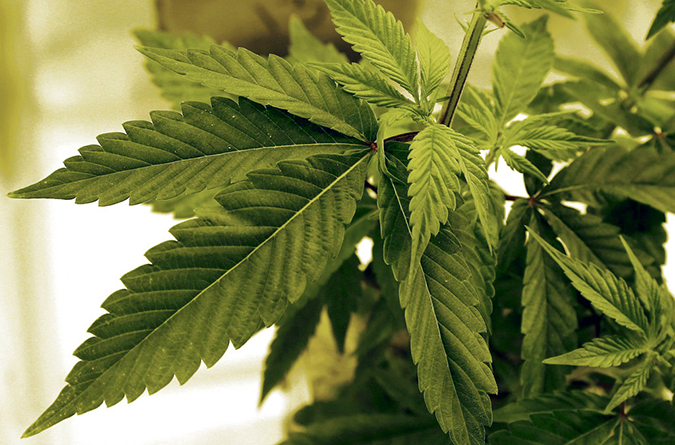Louisiana could lose medical marijuana
FILE – In this June 17, 2015 file photo, medical marijuana plants grow at LifeLine Labs in Cottage Grove, Minn. When U.S. Attorney General Jeff Sessions green-lighted federal prosecutors to pursue violators of federal marijuana laws, not only states that legalized recreational pot are at risk of a crackdown, but so is most of the rest of America. All but four states allow some form of medical marijuana, even Sessions’ home state of Alabama. (AP Photo/Jim Mone, File)
January 17, 2018
The U.S. may have just taken a massive step back from legalizing medical marijuana across every state, including Louisiana.
On Jan. 4, the Department of Justice issued a memo stating that the department has rescinded any non-enforcement policies enacted on marijuana-friendly state laws and called states to prosecute federal law violations relating to marijuana accordingly.
U.S. Attorney General Jeff Sessions, an opponent against any form of legalized marijuana, says that this ruling revokes any previous undermining of the rule of law by enforcing the Controlled Substances Act.
“[The memo released on Jan. 4] on federal marijuana enforcement simply directs all U.S. Attorneys to use previously established prosecutorial principles that provide them all the necessary tools to disrupt criminal organizations, tackle the growing drug crisis and thwart violent crime across our country.” Sessions said.
Although 46 states have legalized medical marijuana in some form, the federal government regulates laws through the Controlled Substances Act. The act states that marijuana is a Schedule I drug and is highly addictive. Most notably, the act recognizes no difference between medical and recreational use.
According to a survey published in the New England Journal of Medicine, 76 percent of doctors supported the use of marijuana for medicinal purposes back in 2013. Medical proponents argue that it helps to diminish a patient’s suffering. Yet the National Institute on Drug Abuse argues that there has yet to be substantial proof that marijuana’s benefits exceed its downsides.
According to a poll published by CBS News in 2017, 88 percent of Americans support the use of marijuana for medicinal purposes. The poll interestingly also found that even half of the people who are against marijuana legalization believe it should be left to the states to legislate, rather than the federal government.
Philip Dynia, chairman and associate professor of political science at Loyola, says that Louisiana cannot legalize medical marijuana as long as federal law deems it illegal.
“The Constitution is pretty clear, and the courts have generally understood that if a state law conflicts with a federal law, the federal law has precedence because it is supreme.” said Dynia. “Louisiana can only legalize [marijuana] in the sense that ‘we’re not going to prosecute anyone here in Louisiana’.”
Louisiana’s law, passed in 2015 and updated again in 2016, allows use of medicinal marijuana for cancer patients, a severe form of cerebral palsy, seizure disorders, epilepsy, muscular dystrophy and other specific diseases, according to the Associated Press. Marijuana can be available in the forms of medicinal oils, pills, sprays and topical applications, but cannot be sold in a form that can be smoked.
The only two agricultural centers allowed to grow medicinal-grade marijuana in Louisiana are at LSU and Southern University, which are both continuing operations without disruption from the Department of Justice’s decision.
Hampton Grunewald, associate vice president of governmental affairs at the LSU Agricultural Center, reemphasized medicinal-grade marijuana’s importance in modern medicine.
“We are closely monitoring all federal actions relative to states with medical cannabis programs authorized by state legislation,” Grunewald said. “Our state’s program is aimed at providing patients with specific disease states alternative medical options, and the ability to conduct research on cannabis as it relates to medical discovery.”









Malcolm Kyle • Jan 18, 2018 at 1:51 pm
Here are several extracts from an article posted at the ‘Tenth Amendment Center’ on 30th Dec 2015, concerning Prohibition and Federal Law:
“Of course, the federal government lacks any constitutional authority to ban or regulate marijuana within the borders of a state, despite the opinion of the politically connected lawyers on the Supreme Court. If you doubt this, ask yourself why it took a constitutional amendment to institute federal alcohol prohibition.”
“FBI statistics show that law enforcement makes approximately 99 of 100 marijuana arrests under state, not federal law.”
“Furthermore, figures indicate it would take 40 percent of the DEA’s yearly-budget just to investigate and raid all of the dispensaries in Los Angeles – a single city in a single state. That doesn’t include the cost of prosecution. The lesson? The feds lack the resources to enforce marijuana prohibition without state assistance.”
“With nearly half the country legalizing marijuana, the feds find themselves in a position where they simply can’t enforce prohibition any more. The feds need state cooperation to fight the “drug war,” and that has rapidly evaporated in the last few years with state legalization, practically nullifying the ban.”
“The lesson here is pretty straight forward. When enough people say, ‘No!’ to the federal government, and enough states pass laws backing those people up, there’s not much the feds can do to shove their so-called laws, regulations or mandates down our throats,” Tenth Amendment Center founder and executive director Michael Boldin said.